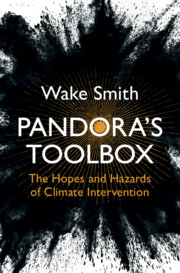Book contents
- Reviews
- Pandora’s Toolbox
- Pandora’s Toolbox
- Copyright page
- Dedication
- Contents
- Figures
- Tables
- Prologue
- Acknowledgments
- Section I Climate Introduction
- Section II Responses to Climate Change
- 6 The Energy Transition
- 7 Other Mitigation
- 8 Adaptation
- 9 Our Descendants Will Demand Climate Intervention
- Section III Carbon Dioxide Removal
- Section IV Solar Radiation Management
- Section V Social Ramifications of Climate Intervention
- Section VI The Path Forward
- Acronyms
- Appendix: Detail in respect of Figures 9.4–9.8
- Notes
- Index
6 - The Energy Transition
from Section II - Responses to Climate Change
Published online by Cambridge University Press: 24 February 2022
- Reviews
- Pandora’s Toolbox
- Pandora’s Toolbox
- Copyright page
- Dedication
- Contents
- Figures
- Tables
- Prologue
- Acknowledgments
- Section I Climate Introduction
- Section II Responses to Climate Change
- 6 The Energy Transition
- 7 Other Mitigation
- 8 Adaptation
- 9 Our Descendants Will Demand Climate Intervention
- Section III Carbon Dioxide Removal
- Section IV Solar Radiation Management
- Section V Social Ramifications of Climate Intervention
- Section VI The Path Forward
- Acronyms
- Appendix: Detail in respect of Figures 9.4–9.8
- Notes
- Index
Summary
This is the first of two chapters that focus on mitigation or emissions reduction. Chapter 6 addresses the primary cause of climate change, which is the emission of CO2 that derives from the combustion of fossil fuels. We review the oppositional forces of exploration and consumption in respect of fossil fuel reserves and the concepts of peak oil, gas, and coal. We turn next to the carbon cycle and how it is altered by widespread fossil fuel combustion. The low hanging fruit in mitigation is to electrify everything within reason and to simultaneously decarbonize our electrical supply. However, grid limitations, scant electrical storage capacity, and the intermittent nature of wind and solar combine to make deep decarbonization a more difficult challenge than is often appreciated. These factors along with the distinct consideration of national energy security help explain why fossil fuels are likely to persist late into this century as a source of dispatchable electric power. Finally, there are economic sectors such as aviation and steel making that lend themselves poorly to electrification and will likely remain recalcitrant sectors.
Keywords
- Type
- Chapter
- Information
- Pandora's ToolboxThe Hopes and Hazards of Climate Intervention, pp. 81 - 100Publisher: Cambridge University PressPrint publication year: 2022



